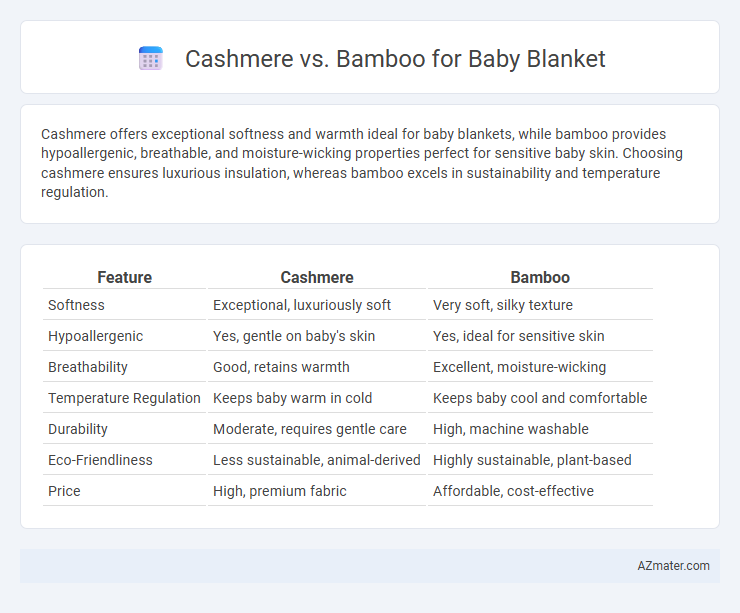Cashmere offers exceptional softness and warmth ideal for baby blankets, while bamboo provides hypoallergenic, breathable, and moisture-wicking properties perfect for sensitive baby skin. Choosing cashmere ensures luxurious insulation, whereas bamboo excels in sustainability and temperature regulation.
Table of Comparison
| Feature | Cashmere | Bamboo |
|---|---|---|
| Softness | Exceptional, luxuriously soft | Very soft, silky texture |
| Hypoallergenic | Yes, gentle on baby's skin | Yes, ideal for sensitive skin |
| Breathability | Good, retains warmth | Excellent, moisture-wicking |
| Temperature Regulation | Keeps baby warm in cold | Keeps baby cool and comfortable |
| Durability | Moderate, requires gentle care | High, machine washable |
| Eco-Friendliness | Less sustainable, animal-derived | Highly sustainable, plant-based |
| Price | High, premium fabric | Affordable, cost-effective |
Introduction: Choosing the Right Fabric for Baby Blankets
Cashmere and bamboo are popular fabrics for baby blankets due to their softness and durability, but their distinct properties impact comfort and care. Cashmere offers luxurious warmth and hypoallergenic qualities, making it ideal for cooler climates, while bamboo provides breathability, moisture-wicking, and natural antibacterial benefits suited for sensitive skin. Selecting between cashmere and bamboo depends on factors like climate, sensitivity, and ease of maintenance for optimal baby comfort.
Overview of Cashmere and Bamboo Materials
Cashmere, sourced from the soft undercoat of cashmere goats, offers exceptional warmth, lightweight softness, and natural insulation, making it ideal for baby blankets. Bamboo fabric, derived from bamboo pulp, provides antibacterial properties, hypoallergenic comfort, and superior breathability while being environmentally sustainable. Both materials ensure gentle touch and durability, but cashmere excels in warmth and luxury, whereas bamboo prioritizes moisture-wicking and eco-friendliness.
Softness and Comfort Comparison
Cashmere baby blankets provide unparalleled softness due to their fine, lightweight fibers that offer a luxurious, silky touch ideal for sensitive baby skin. Bamboo fabric is naturally breathable and moisture-wicking, enhancing comfort by regulating temperature and preventing overheating. Both materials deliver exceptional coziness, but cashmere excels in plush softness while bamboo stands out for its hypoallergenic and cooling properties.
Hypoallergenic Properties for Sensitive Skin
Cashmere and bamboo fibers both offer hypoallergenic properties ideal for baby blankets, but bamboo stands out due to its natural antimicrobial and moisture-wicking capabilities, reducing the risk of irritation for sensitive skin. Cashmere is luxuriously soft and offers excellent warmth, yet it may sometimes trigger allergies for babies with extremely sensitive skin because it is animal-derived. Bamboo fabric, being plant-based and naturally hypoallergenic, is often recommended by dermatologists for infants prone to eczema and skin sensitivities, making it a safer choice for delicate baby skin.
Breathability and Temperature Regulation
Cashmere offers excellent breathability due to its natural fibers, allowing air circulation that helps maintain an ideal temperature for babies. Bamboo fabric excels in moisture-wicking properties, effectively regulating temperature by keeping babies cool in warm weather and warm in cooler conditions. Both materials provide superior comfort, with cashmere better suited for cooler climates and bamboo ideal for versatile, year-round use.
Durability and Longevity of Blankets
Cashmere baby blankets offer exceptional durability due to their long fibers and natural elasticity, ensuring the blanket maintains softness and shape after multiple washes. Bamboo blankets are highly resistant to wear and tear, benefiting from antimicrobial properties that prevent deterioration caused by bacteria and mold over time. Both materials provide longevity, but cashmere's dense fiber structure generally results in a longer-lasting blanket compared to bamboo.
Eco-Friendliness and Sustainability Factors
Cashmere baby blankets, derived from the fine undercoat of cashmere goats, often involve intensive grazing that can lead to land degradation and overgrazing concerns. Bamboo baby blankets use bamboo fibers, which grow rapidly and require fewer pesticides and less water, making them a more eco-friendly and sustainable choice. Bamboo's renewable nature and biodegradability position it as a preferred option for environmentally conscious parents seeking sustainable baby textiles.
Ease of Cleaning and Maintenance
Cashmere baby blankets require gentle hand washing or dry cleaning to maintain their softness and avoid damage, making their upkeep more delicate and time-consuming. Bamboo baby blankets are machine washable and quick drying, offering superior ease of cleaning and low-maintenance care suitable for busy parents. Bamboo fibers are naturally resistant to odors and bacteria, reducing the frequency of washing compared to cashmere.
Price and Value for Money
Cashmere baby blankets typically come with a higher price tag due to the luxurious softness and natural insulation properties of cashmere fibers. Bamboo blankets, often more affordable, provide excellent moisture-wicking and hypoallergenic benefits, making them a cost-effective choice for sensitive baby skin. When evaluating value for money, bamboo blankets deliver durable comfort and eco-friendly qualities at a significantly lower cost, while cashmere offers unmatched warmth and premium feel for a luxury investment.
Final Verdict: Which Blanket is Best for Your Baby?
Cashmere baby blankets offer exceptional softness and warmth, ideal for colder climates but often come at a higher price point and require delicate care. Bamboo blankets provide excellent breathability, hypoallergenic properties, and moisture-wicking benefits, making them suitable for sensitive skin and warmer environments. Choosing the best blanket depends on your baby's specific needs, climate, and your preference for natural fibers versus ease of maintenance.

Infographic: Cashmere vs Bamboo for Baby Blanket
 azmater.com
azmater.com